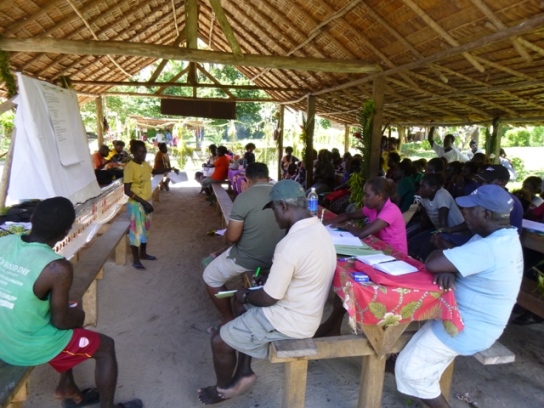
A project using natural adaptation methods to address climate change has received a warm welcome by villages in Choiseul Province, Solomon Islands.
Funded by USAID the Ecosystem based Adaptation Project is coordinated by the Secretariat of the Pacific Regional Environment Programme (SPREP) in collaboration with GIZ, The Nature Conservancy, Lauru Land Conference of Tribal Communities and the Choiseul Provincial Government.
The partners are working together to undertake village level vulnerability and adaptation consultations in order to align climate change adaptation strategies with village and Government needs in Choiseul Province.
"After visiting 11 villages in North Choiseul, villagers told us clearly that they are feeling the effects of climate change, and also non-climate change related stress, on resources that are vital to their livelihoods," said Mr. Paul Donohoe, SPREP's Ecosystem based Adaptation to Climate Change Officer.
"We've learnt that the greatest threats for them are the impacts on their subsistence food crops and fish, storm surges, weather pattern changes and coastal erosion."
Mr. Donohoe also noted that there are numerous logging operations working in the Province and a large scale nickel mining proposal in East Choiseul.
"As the local economy shifts from subsistence to a blend of subsistence and cash, villagers are very aware that there is increasing pressure on resources and a need for good resource management to attain sustainable development in their villages and in the Province."
"Their future livelihoods depend on the maintained provision of ecosystem services," he said.
Ecosystem-based Adaptation (EbA) is the use of biodiversity and ecosystem services as part of an overall adaptation strategy to the adverse effects of climate change. By taking into account the ecosystem services on which people depend for their livelihoods as well as social and economic security, EbA integrates sustainable use of biodiversity and ecosystem services in a comprehensive adaptation strategy. Healthy ecosystems are more able to adapt to the effects of climate change and continue to provide for the people of Choiseul Province.
"One of the main strategies that people have identified to cope with these threats is community action planning, providing people at a village level with a strategy for sustainably managing the natural resources that are crucial to their livelihoods. These plans need to follow whole catchment areas in a 'ridge to reef' approach. In our community consultations, people from Choiseul have already observed that degradation of the land has affected the health of their coral reefs and freshwater rivers."
The Provincial Government has recognised this approach must be inclusive of multiple sectors, and have included staff from agriculture, fisheries, water resources, education, meteorology and forestry in these vulnerability consultations.
Villages and Choiseul Provincial Government have also recognized that Marine and Terrestrial Protected Areas, particularly based on Traditional methods of resource management such as tabu areas, coastal revegetation and alternative sustainable livelihood projects, such as Eco-Timber projects, are important for villagers to enjoy a sustainable future.
The Choiseul Provincial Government and the Solomon Islands National Government have committed to building best practice holistic climate change adaptation models in Choiseul Province that can be replicated in other areas within the country and in the wider Pacific Island region. SPREP and other agencies have committed to working collaboratively in order to assist in achieving these goals.